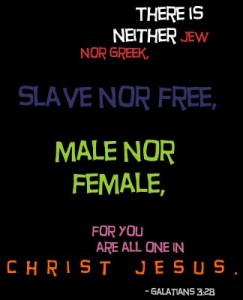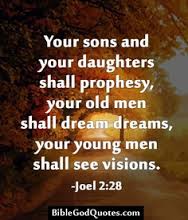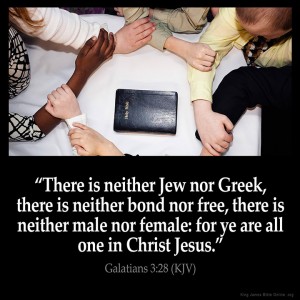Galatians 3.28, Baptism & Women in the Gathering
Author: Bobby Valentine | Filed under: Baptism, Church, eschatology, Exegesis, Galatians, Hermeneutics, Holy Spirit, Paul, Women, Worship Recently I have been involved in a few discussions via email and even phone calls about Galatians 3.28. One of my conversation partners termed Gal 3.28 as “your egalitarian’s sugar text.”
Recently I have been involved in a few discussions via email and even phone calls about Galatians 3.28. One of my conversation partners termed Gal 3.28 as “your egalitarian’s sugar text.”
I was, to be honest, taken aback by the rather condescending perspective on this or any biblical text. Paul did write it. And it does have some meaning. So for this Freaky Friday I want to share just a few observations related to this important and anything but sugar text.
One brief note. Many have arrived at the biblical position that women are empowered to read, pray, serve, and teach yet never base a single point of their argument on Galatians 3.28. C. R. Nichol never once even quotes Galatians 3.28 in his marvelous study God’s Woman and yet still arrived at the biblical position that women clearly are allowed to perform these functions. See my C. R. Nichol’s God’s Woman.
A Sort of Agreement
First of all, I agree that Galatians 3.28 is not, in its literary context, aimed primarily at “the worship service.” I would suggest that such a notion is anachronistic in the first place. Yet my conversation partners have zero problem with taking Ephesians 5.19, a text that clearly has nothing to do with a “worship service” in its context, and applying it to debates on instrumental music in a worship service.
But though the context of Galatians is not primarily about gathered worship, per se, I do not believe we can push that very far. In fact, I believe that given the matter of table fellowship, that is fellowship at the Lord’s table, in Galatians 2, we are on far safer grounds applying 3.28 to a worship gathering than Ephesians 5.19. The table fellowship that Peter, and the rest of the Jews, withdrew from (to a separate table) is almost certainly the Agape meal/Lord’s Supper of the Antioch church and not a different booth at McDonald’s. Thus this is something that is taking place in the gathering (assembly) of the church.
The status at the Table reflects the equal status of Gentile believers in the renewed Israel of God. That is the Table, and thus the assembly, are a projection of the New Creation itself into the present world. In the New Creation there is no “Jew nor Greek” (the very issue in Galatians) nor “male nor female.” This is in fact the application of Pauline eschatology to the living breathing reality of church/the Gathered People on the ground in Galatia. The gathering must look like the reality it proclaims at the Table. There can be no Jew/Greek or Male/Female here because there is none there (i.e. in the renewed world).
So while Paul does not mention two songs and a prayer, he does frame the entire epistle to the Galatians from the perspective the Table has no divisions at it. Paul chastises Peter for perverting the table in Galatia along ethnic lines. He likewise castigates the Corinthians for perverting the table along economic lines. In both contexts Paul makes remarkably similar, though almost always overlooked, statements about the nature of the body of Christ flowing out of the waters of baptism.
In 1 Corinthians just after discussing the shaming of the poor at the Lord’s Table, he proclaims there is,
“one body that has many members, though many members are in the one body, so it is with Messiah. For in one Spirit we were all baptized … Jews or Greeks, SLAVE or FREE – we are all one” (1 Cor 12.12-13, Paul makes nearly an identical statement in Col 3.11 too).
There are no slaves or free at God’s table. There is no higher or lower status. We are “one.” Why does Paul mention the “slaves?” Because it is the poor slaves that are being shafted by the rich free persons at the table. They are supposed to be new creation on display before the fallen world. So badly did they muddle it that Paul told them it would have been better if they simply did not show up to the gathering!
Galatians applies baptism in much the same way. Paul says that through faith in Christ, via baptism, that Gentiles are now children of Abraham. Baptism affirms the Abrahamic covenant. Through baptism Abraham becomes the father of many nations.
“As many of y’all as were baptized into Messiah have wrapped yourselves with Messiah. There is no longer Jew or Greek, there is no longer slave nor free, there is no longer male nor female; for all of y’all are ONE in Messiah Jesus. And if y’all belong to Messiah, then y’all are Abraham’s children, inheritors according to the promise.” (Bobby V translation)
This text in fact sounds an awful lot like 1 Corinthians 12.12-13, quoted above which is explicitly directed to assembly concerns in its context. And I believe that it is division at the table that prompts Paul to say what he does in Galatians 3.28 (Paul is not talking about a meal at the local Antioch Burger King). In both places, ironically, they got the table wrong because they did not understand the doctrine of baptism properly (now isn’t that ironic for Church of Christ folks not to understand the doctrine of baptism as it relates to demolishing the categories of the fallen world!).
There is in fact, according to Gal 3.28 (but not Gal 3.28 only) a reordering of the social fabric of the world. That reordering of the social fabric is none other than the Gathered assembly, as the forefront of the “new creation,” which Paul mentions explicitly in Galatians 6.15. It is precisely the coming of the new humanity, because of the Messiah, why circumcision is no longer “the” sign of God’s humanity. External markers are removed as status symbols in the community of Christ. This is in fact what Galatians 3.28 teaches. Ethnic division cannot exist “in Christ” any more than economic division can. Both of these fit an “Old Testament” paradigm as we shall see and I think it applies to the male/female as well. First Corinthians 12 and Galatians 3.28 are proclaiming the same reality.
Baptism, the Christian sacrament, ironically ties the Testaments together. The point of the passage was not that Paul was defeating Baptists in a debate on baptism. He is arguing that ethnic Gentiles are truly Abraham’s children, that is part of the family. The pinnacle of Paul’s argument is not verse 27, which I memorized as a young man as a proof text on baptism. The pinnacle of the argument is in verses 28 and 29, that if we belong to the Messiah then in fact God has honored his covenant with Abraham and the new creation has occurred. Thus baptism serves “Old Testament” theology. That is God’s covenant and prophetic promises are being fulfilled.
Baptism creates a God’s new humanity and the table in the middle of the assembly is where that new creation is proclaimed to the world. The Galatians (and Antioch) violated the table with ethnic categories from the old world. The Corinthians violated the sacred table by importing social status from the old world. In each case Paul proclaimed a radical doctrine of baptism in response … You are supposed to be the new world.
 The “Old Testament” Context of Galatians 3.28
The “Old Testament” Context of Galatians 3.28
Most biblically literate people know that Peter announces on the Day of Pentecost that God has finally made good on his promises to Israel. He quotes from the prophet Joel to show that God has renewed his covenant, that he was undoing the dreadful impact of sin on creation by pouring out the healing Spirit afresh on all flesh because the Messiah’s resurrection had ushered in the new age.
“Then afterward I will pour out my Spirit on all flesh; your sons and your daughters shall prophecy, your old men shall dream dreams and your young men shall see visions. Even on your male and female slaves, in those days, I will pour out my Spirit” (Joel 2.28-29)
Luke clearly uses this prophecy to frame the story of Jesus and the early church. He begins his Gospel with a sudden on rush of the ministry of the Holy Spirit. He tells stories of both old men, old women and a young woman all being moved by God’s Spirit. He tell us of “daughters” that prophesy. And on the day of renewal, Peter says the Spirit has been given as God promised.
But what is not often noticed is that Joel 2 is also important for Paul. Read again that text in 1 Corinthians 12.12-13 and now Galatians 3.28. There is a clear parallelism. Take a look at Galatians and Joel:
Galatians 3:26-28 Joel 2:28-29
Jew/Greek All Flesh
Male/Female Sons/Daughters
Free/Slave Free/Slave
Paul’s clearly understands our baptism as furthering the prophetic promises of a renewed creation and humanity brought about by God’s own Spirit in Joel 2. God promises to reverse the curse on all flesh, the whole of creation, in Joel. The baptized Christian community in Antioch, Galatia and Corinth are supposed to look like a Joel 2 and Acts 2 community. The distinctions of creation are not erased in the new creation. The status symbols of the “fall” are muted and undone however. Patriarchy as the basis of status is gone, just like status based on ethnicity and economics has been erased. Old, Young; Slave, Free; Male, Female are all equal in the new creation. If the first two are undone at the table, and Galatians and 1 Corinthians proves they are, then it is the height of special pleading to say the third category is some how excluded.
Final Thought
For Paul, baptism places us in the new world to come. The assembly and its Table are the places in this world where the new world is made manifest. That is why Paul castigates the Galatians and the Corinthians. They have brought the fallenness of this world to God’s new creation zone. It cannot be done.
So while a person can say “Galatians 3.28 is your sugar text that has nothing to do with the assembly,” I will respond that you do not understand the nature of salvation in Christ itself. Salvation is not simply my personal vertical relationship with God. Salvation is “in Christ” and I have it because I am part of the Israel of God, a community. Paul does not use individual pronouns but plurals. Yall belong to the Messiah if yall are Abraham’s! If yall are Abraham’s then yall are inheritors. If yall are inheritors then yall are new creation. The new creation has none of the social distinctions of status from the old distorted and fallen creation.
In the new creation, according to the prophecy that Paul roots his language in, says that women, slaves, and even men will be graced by God as vehicles of prophecy.
So I do agree on Gal 3.28 to a point. But I think many miss the point that Gal 3.28 makes about the nature of new creation in Christ. Therefore, Paul is not speaking out of both sides of his mouth when he limits certain female (and male btw) participation in 1 Corinthians 14 and 1 Timothy any more than when he tells folks that it is better not to get married in 1 Cor 7!!!!
Was Paul opposed to marriage? I mean after all it IS in that context Paul claims to have the Spirit of Christ! But in light of the present situation Paul feels that not marrying is the best course of action but he is hardly anti-sex and marriage.
Likewise in light of the CURRENT problem in Corinth, Paul limits SOME females, and SOME males, arguing in the gathering but he does not say women cannot pray or prophesy in the assembly. He already recognized their right in chapter 11. I cannot get away from this. It is just a fact, not an opinion, that women were doing this with Paul’s approval … precisely because 1 Cor 12.12-13 and Gal 3.28 is true and the social fabric has indeed been reordered in Christ as the new creation.
That is the common sense reading and does justice to ALL the data not just some of it. Paul’s historical context and his biblical context are important and neither can be dismissed for those who care for biblical authority.
Shalom.

April 22nd, 2016 at 6:35 pm
And THIS is why I love you. Brilliant. As always. And helpful, too, as I’m preaching on Philemon in a week and a half. This will preach.
April 22nd, 2016 at 7:01 pm
Honored to have you comment on my blog Patrick Mead. And humbled by your words. You bless me and many others routinely and for that I am grateful. Delighted to hear you are preaching from that sadly overlooked radical letter Philemon. May God bless those who hear you.
April 22nd, 2016 at 10:16 pm
It is important to note the slight difference in Paul’s conjunctions in Gal. 3:27-28: “There is no longer slave *or* free, there is no longer male *and* female.” In the age to come, the difference between slave and free ceases to exist entirely. With respect to male and female, the emphasis shifts to the coupling of male and female that passes away (in keeping with Jesus’ words about the absence of marriage in the resurrection). Gender identity does not necessarily disappear, but gender roles, at least insofar as they are defined by marriage, no longer exist in the age to come.
I’ve found it helpful to understand Gal. 3:27-28 against the backdrop of the ancient world’s understanding of human society, where Aristotle in his “Politics” talks about the essential elements of any form of human community or partnership. Those basic elements included “the union of make and female for the continuance of the species” (procreation), and “the union of natural ruler (master) and natural subject (slave) for the sake of security.” The world of thought at the time of Paul considered the division of slave and free and the coupling of male and female essential elements in every form of human society. For Jews, these two primal divisions in society included a third division: Jew and Gentile.
It’s against this backdrop that we see the radical nature of Gal. 3:27-28 in this early baptismal formula. The Christian existence entails nothing less than a radical eschatological reordering of society as a whole. Those basic distinctions in the ancient world are swept away in Christ and would certainly be evident at the table fellowship at the assembly, as Valentine correctly describes. It’s clear to me that this radical reordering is reflected in the variety of ways that women were exercising significant leadership in the life of the church. It may also explain why some Christians at Corinth were concerned about marriage and may have thought the final eschaton had fully arrived, thus abstaining from coupling.
February 16th, 2017 at 11:57 am
Fantastic!!